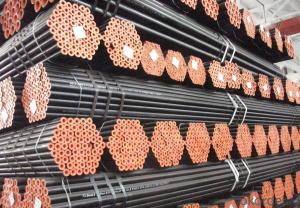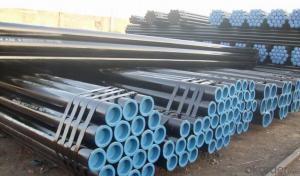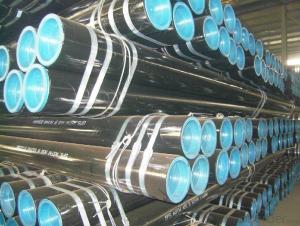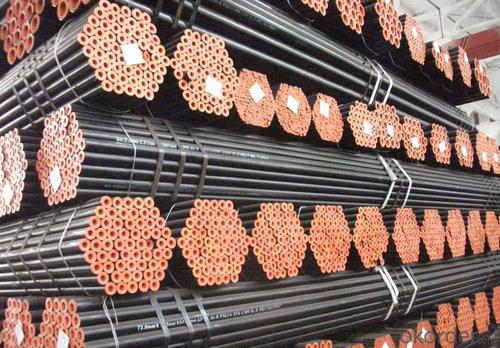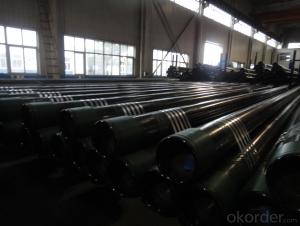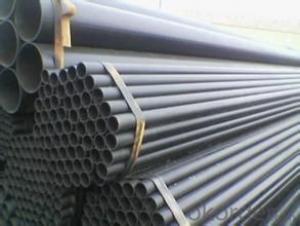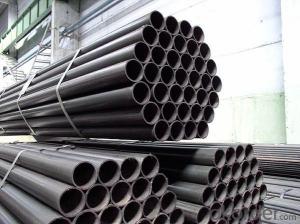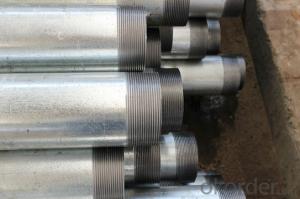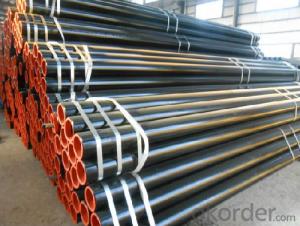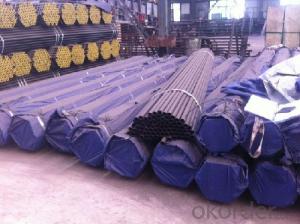Seamless Steel Pipes Widely Used Multi Models
- Loading Port:
- Tianjin
- Payment Terms:
- TT or LC
- Min Order Qty:
- 100 m.t.
- Supply Capability:
- 1000 m.t./month
OKorder Service Pledge
OKorder Financial Service
You Might Also Like
1、Structure of Seamless Pipe :
Seamless pipe is formed by drawing a solid billet over a piercing rod to create the hollow shell. Historically seamless pipe was regarded as withstanding pressure better than other types, and was more easily available than welded pipe.
2、Main Features of the Seamless Pipe:
• High manufacturing accuracy
• High strength
• Small inertia resistance
• Strong heat dissipation ability
• Great visual effect
• Reasonable price
3、Seamless Pipe Specification:
Standard | GB, DIN, ASTM ASTM A106-2006, ASTM A53-2007 |
Grade | 10#-45#, 16Mn 10#, 20#, 45#, 16Mn |
Thickness | 8 - 33 mm |
Section Shape | Round |
Outer Diameter | 133 - 219 mm |
Place of Origin | Shandong, China (Mainland) |
Secondary Or Not | Non-secondary |
Application | Hydraulic Pipe |
Technique | Cold Drawn |
Certification | API |
Surface Treatment | factory state or painted black |
Special Pipe | API Pipe |
Alloy Or Not | Non-alloy |
Length | 5-12M |
Outer Diameter | 21.3-610mm |
Grade | 20#, 45#, Q345, API J55, API K55, API L80, API N80, API P110, A53B |
Standard | ASME, ASTM |
4、Packaging & Delivery
Packaging Details: | seaworthy package,bundles wrapped with strong steel strip |
Delivery Detail: | 15-30days after received 30%TT |
5、FAQ of Seamless Pipe:
①How is the quality of your products?
Our products are manufactured strictly according to national and internaional standard.Guaranteed: If products’ quality don’t accord to discription as we give or the promise before you place order, we promise 100% refund.
②How about price?
Yes, we are factory and be able to give you lowest price below market one, and we have a policy that “ for saving time and absolutely honest business attitude, we quote as lowest as possible for any customer, and discount can be given according to quantity”,if you like bargain and factory price is not low enough as you think, just don’t waste your time.
③Why should you chose us?
Chose happens because of quality, then price, We can give you both.Additionally, we can also offer professional products inquiry, products knowledge train(for agents), smooth goods delivery, exellent customer solution proposals.Our service formula: good quality+good price+good service=customer’s trust
SGS test is available, customer inspection before shipping is welcome, third party inspection is no problem.
Any question, pls feel free to contact us !
6、Seamless Pipe Images:
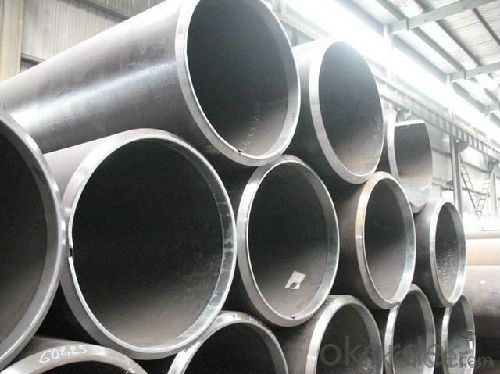
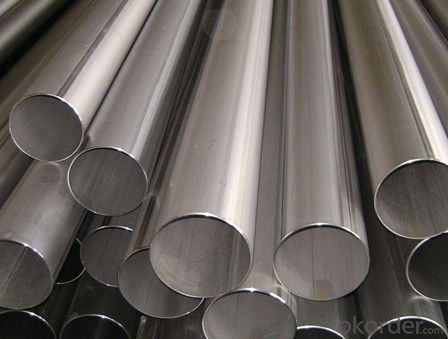
- Q: Can steel pipes be used for underground oil pipelines?
- Yes, steel pipes can be used for underground oil pipelines. Steel pipes are commonly used for this purpose due to their strength, durability, and resistance to corrosion. They are capable of withstanding the high pressure and extreme conditions associated with oil transportation underground.
- Q: How are steel pipes insulated to prevent noise transmission?
- Steel pipes are typically insulated to prevent noise transmission by using materials such as fiberglass or mineral wool wraps. These insulating materials are wrapped around the pipes, creating a barrier that absorbs and dampens sound waves, reducing noise transmission. Additionally, acoustic lagging or jackets can also be applied to further reduce noise and vibration.
- Q: Can steel pipes be used in the oil and gas industry?
- Yes, steel pipes are commonly used in the oil and gas industry. Steel pipes are known for their strength, durability, and resistance to corrosion, making them suitable for transporting and storing various fluids and gases in the industry. These pipes can withstand high pressure and extreme temperatures, which are often encountered in oil and gas operations. Additionally, steel pipes can be easily welded together, allowing for efficient assembly and maintenance. Overall, steel pipes are a reliable and cost-effective choice for the oil and gas industry.
- Q: How are steel pipes used in the construction of shipbuilding?
- Steel pipes are widely used in shipbuilding as they provide structural support and are essential for various systems and components such as ventilation, fuel, and water supply. They are used to create the framework of the ship, including the hull, bulkheads, and decks. Additionally, steel pipes are crucial for piping systems that transport fluids and gases throughout the ship, ensuring its proper functioning and safety.
- Q: What are the lengths of scaffold steel tubes?
- Scaffolding steel pipe standard length is 6 meters, for easy use, respectively, 6 meters, 3 meters, 2 meters, 1.5 meters, 1 meters, etc., if there is a special length, you need to intercept.
- Q: How are steel pipes used in industrial manufacturing processes?
- Steel pipes are commonly used in industrial manufacturing processes for various purposes, such as transporting fluids, gases, and solids, as well as providing structural support. They are used to create pipelines for water, oil, and gas transportation, as well as for conveying materials like ores and grains. Additionally, steel pipes are utilized in machinery, equipment, and infrastructure construction due to their strength, durability, and resistance to high pressure and extreme temperatures.
- Q: How are steel pipes used in the textile industry?
- Steel pipes are used in the textile industry to create a network of pipes for transporting water, steam, and other fluids that are crucial for various processes such as dyeing, washing, and finishing fabrics. These pipes ensure the efficient and reliable supply of these fluids, contributing to the smooth functioning of textile manufacturing operations.
- Q: How can galvanized steel pipe be connected with stainless steel pipe?
- Welding methods are used to connect. Because galvanized pipe is in fact carbon steel pipe, so galvanized pipe and stainless steel pipe welding, in fact, carbon steel and stainless steel welding, welding of dissimilar materials.
- Q: Can steel pipes be used for piling?
- Yes, steel pipes can be used for piling. Steel pipes are often used as piles in construction projects due to their strength, durability, and ability to withstand heavy loads. They provide strong support for structures and are commonly used in foundation systems for buildings, bridges, and other infrastructure.
- Q: How are steel pipes used in automotive manufacturing?
- Steel pipes are commonly used in automotive manufacturing for various applications such as exhaust systems, fuel lines, and structural components. They provide durability, strength, and corrosion resistance, making them suitable for withstanding the harsh conditions and high temperatures associated with automotive operations. Additionally, steel pipes offer flexibility in design and can be easily formed and manipulated to meet specific requirements, ensuring efficient and reliable performance in vehicles.
Send your message to us
Seamless Steel Pipes Widely Used Multi Models
- Loading Port:
- Tianjin
- Payment Terms:
- TT or LC
- Min Order Qty:
- 100 m.t.
- Supply Capability:
- 1000 m.t./month
OKorder Service Pledge
OKorder Financial Service
Similar products
Hot products
Hot Searches
Related keywords
